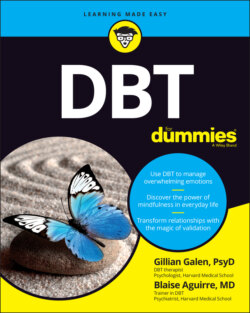Читать книгу DBT For Dummies - Gillian Galen - Страница 98
Being Aware of How Your Emotions Manifest in Action
ОглавлениеWhen you’re engaging in mood-dependent behavior, you’re acting on the urges caused by your underlying emotional state. An example of this is when, for instance, you have a low mood and have the urge not to get out of bed or see anyone. Staying in bed and not seeing your friends would be mood-dependent behavior. If you are feeling angry and lash out at your co-worker for a seemingly trivial transgression, that is mood-dependent behavior.
For people who are prone to such behavior, when the mood has passed, they can often feel guilty or shameful about their behavior. In the moment, however, the person acting on their emotions without thinking frequently feels justified and right for having done so. The alternative of stopping and reflecting on what to do, or even tolerating the discomfort of the emotion, can feel unbearable. Mood-dependent behavior can bring instant relief and feels great in the short run, only to cause greater harm in the long run.
For any individual, every emotion has an action urge, and it’s a core part of DBT for the person to know their typical behavior when they are feeling strong emotions. If you struggle in this way, being mindful is key to developing the awareness of how your emotional state in the present moment leads to these behaviors. Mindfulness is also key to then having a more deliberate response. This means that when a strong emotion arises, you should take the time to pause and ask yourself the following:
“Is what I am about to do consistent with my long-term goals and values?”
“Will this behavior actually get me what I want?”
“How likely is my behavior going to lead to regret, guilt, and shame?”
